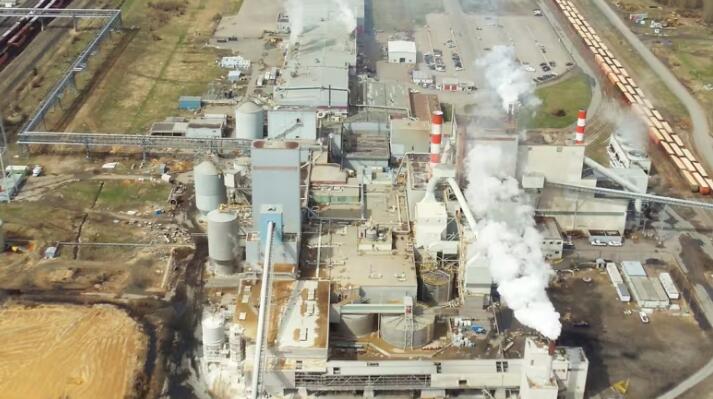Canfor permanently closes pulp line in Prince George, cuts 300 jobs

Company says the pulp line at its Prince George Pulp and Paper Mill will be phased out by the end of March
B.C. forestry giant Canfor Pulp says it is permanently closing the pulp line at one of its Prince George mills, which will result in about 300 jobs lost.
The move comes as several forestry companies around the world are downsizing their operations due to changes in the market.
Kevin Edgson says the lack of raw material for creating market pulp led to the decision.
“In recent years, several sawmills have permanently closed in the Prince George region due to deductions in the allowable annual cut and challenges accessing cost-competitive fibre,” the Canfor president and CEO said in a written statement.
“This has had a material impact on the availability of residual fibre for our pulp facilities and we need to right-size our operating platform.”
- Canfor reduces Prince George pulp mill operation leaving 200-plus people off work for 4 weeks
The pulp line converted wood fibre into market kraft pulp, which is used for the manufacture of products including paper, tissues and towels.
The company says the pulp line at its Prince George Pulp and Paper Mill will be phased out by the end of March, cutting approximately 300 positions across the organization.
“We expect about 300 jobs in Prince George will be lost across the Canfor Pulp organization with the shutdown of the pulp line at PG Pulp and Paper Mill. This includes staff and hourly positions,” a spokesperson for the company said in an email statement.
“We will be working closely with the Public and Private Workers of Canada Local 9 which represents our employees at both the PG Pulp and Intercon mills to ensure that the Collective Agreement is followed and to support employees who are losing their job through this transition.”
A specialty paper facility at the mill will continue to operate.
Reduced operations across the industry
Canfor operates a total of four mills in Prince George, including a sawmill, the Prince George Pulp and Paper Mill, Northwood Pulp Mill and Intercontinental Pulp, each specializing in different wood and paper products.
However, operations at these locations have been curtailed in recent months.
Last week, the company said it would be extending sawmill curtailments across B.C. due to what it says are ongoing weak economic conditions and a lack of available fibre, affecting workers in Prince George, Chetwynd, Vanderhoof and Houston, B.C.

Similarly, Tolko Industries announced the extension of downtime at its Soda Creek and Armstrong Lumber operations, citing market uncertainty, a move impacting more than 350 employees.
And earlier Wednesday, Burnaby-based Interfor Corp., said it will be reducing lumber production by at least eight per cent this quarter as market uncertainty affects demand.
- B.C. timber industry in throes of change, as premier warns of ‘exhausted forests’
Those cuts, the company said, will likely impact its operations in the U.S. — a move similar to that made by the B.C.-based West Fraser Timber Co. Ltd., who on Tuesday said it would indefinitely curtail its Perry Sawmill in Florida later in January due to high fibre costs and softening lumber markets.
The lumber market has gone through unprecedented volatility in prices in recent years as the industry went through supply and demand shocks brought on in part by the COVID-19 pandemic.
Premier warns B.C.’s forests under ‘stress’
Last month, B.C. premier David Eby warned that the province’s forestry sector has “never been under greater stress.”
In his mandate letter to new forests minister Bruce Ralston, Eby wrote there is an “inescapable recognition that change is needed to ensure our forest industry is sustainable.”

Bob Simpson, former mayor of Quesnel and former B.C. cabinet minister currently serving on a forestry advisory committee for the province, says although the forest industry has gone through change in the past, it’s never been as significant as what is currently underway.
“I think it’s a higher degree of curtailments across the province, across the sector, that’s added a higher degree of uncertainty against the backdrop of pretty significant inflationary measures,” he said in an interview on CBC Daybreak North last week.
He also said the decline is the result of the industry failing to adapt to a changing economic and environmental climate, spending years clear-cutting and exporting raw logs for short-term profits rather than long-term sustainability.
“That model is really collapsing.”
Related News
U.S. Supreme Court upholds ruling ordering Trump administration to fulfil $2B in USAID contracts
Demonstrators hold signs on Feb. 27 in Washington, D.C., to honour former USAID employees terminatedRead more
Quebec, Ontario mayors shut out from White House annual meeting
Montreal Mayor Valérie Plante travelled to Washington D.C. to attend an annual meeting at theRead more
